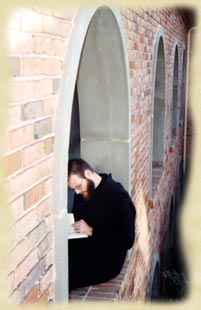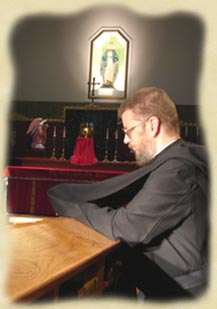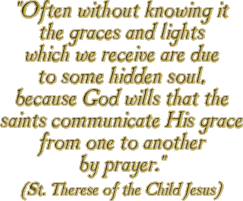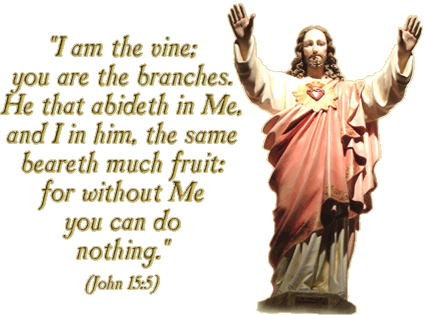

 he hidden life of silence, solitude, work, and prayer of the contemplative
frequently compels many to ask, at least within themselves: “Why do they
want to bury themselves in a monastery when there is so much good to be
accomplished in the world? Why such a waste?” Not only do these questions
often betray a weak faith in God, they usually indicate a lack of
understanding of the hidden workings of Divine grace in the souls of men.
Minds infected with the wisdom of this world are incapable of seeing past
mere natural virtue for the solution of the world’s problems. In this
light, they will never understand the tremendous force and efficacy of the
contemplative life for the Church and for a world gone mad with sin. No
one has the real welfare of the world more at heart than a true
contemplative.
he hidden life of silence, solitude, work, and prayer of the contemplative
frequently compels many to ask, at least within themselves: “Why do they
want to bury themselves in a monastery when there is so much good to be
accomplished in the world? Why such a waste?” Not only do these questions
often betray a weak faith in God, they usually indicate a lack of
understanding of the hidden workings of Divine grace in the souls of men.
Minds infected with the wisdom of this world are incapable of seeing past
mere natural virtue for the solution of the world’s problems. In this
light, they will never understand the tremendous force and efficacy of the
contemplative life for the Church and for a world gone mad with sin. No
one has the real welfare of the world more at heart than a true
contemplative.
 monk withdraws from the world to focus his attention on his own
sanctification, not out of indifference or contempt for his fellow human
beings, but in order to lead as many as possible into the arms of a loving
God. By fixing his gaze on Christ and living for Him alone in the
monastery, the monk is acquiring abundant grace for others and radiating a
spiritual influence on the world that is incalculable. The contemplative
vocation is entirely dedicated to the salvation of souls, precisely
because it is a life utterly given to God. To live for God alone is
certainly not to live for oneself. Far from being selfish, this gift of
oneself to God, this laying down of one’s life for his friends, is the
greatest act of charity. For loving men in and through God, the monk’s
love is purer and more powerful to obtain for them every grace and
blessing. The soul of the contemplative is like a vessel placed near the
fountain of holiness, God Himself. The greater the union of the soul with
God, the greater the channel through which God will pour forth His grace
upon souls. If prayer is what moves the mercy of God, why not a life of
prayer?
monk withdraws from the world to focus his attention on his own
sanctification, not out of indifference or contempt for his fellow human
beings, but in order to lead as many as possible into the arms of a loving
God. By fixing his gaze on Christ and living for Him alone in the
monastery, the monk is acquiring abundant grace for others and radiating a
spiritual influence on the world that is incalculable. The contemplative
vocation is entirely dedicated to the salvation of souls, precisely
because it is a life utterly given to God. To live for God alone is
certainly not to live for oneself. Far from being selfish, this gift of
oneself to God, this laying down of one’s life for his friends, is the
greatest act of charity. For loving men in and through God, the monk’s
love is purer and more powerful to obtain for them every grace and
blessing. The soul of the contemplative is like a vessel placed near the
fountain of holiness, God Himself. The greater the union of the soul with
God, the greater the channel through which God will pour forth His grace
upon souls. If prayer is what moves the mercy of God, why not a life of
prayer?


 aint
Therese of the Child Jesus, a humble contemplative nun, spent her whole
life as a religious within the enclosure of an obscure convent. She did
nothing which the world would consider useful or beneficial to humanity.
Simply by offering to God her prayer, suffering, and obedience she was
able to move mountains in the spiritual world. There was no act which was
too trivial or indifferent which she did not sanctify by love, offering
all to God for His glory and the salvation of souls. Ever since her death,
she has brought untold thousands closer to God and Pope Pius XI proclaimed
her patron Saint of missionaries.
aint
Therese of the Child Jesus, a humble contemplative nun, spent her whole
life as a religious within the enclosure of an obscure convent. She did
nothing which the world would consider useful or beneficial to humanity.
Simply by offering to God her prayer, suffering, and obedience she was
able to move mountains in the spiritual world. There was no act which was
too trivial or indifferent which she did not sanctify by love, offering
all to God for His glory and the salvation of souls. Ever since her death,
she has brought untold thousands closer to God and Pope Pius XI proclaimed
her patron Saint of missionaries.

 any
seem to think that the saving of souls necessitates much running about and
preaching, spreading the gospel by shouting the good news from the
housetops. Few understand the immense value of a life of ordinary labor
and of suffering lived by one who offers all to God in a spirit of prayer.
Christ did more for our salvation in three hours of complete immobility
on the cross than He did in three years of preaching to the people. A
humble soul, either in the cloister or in the home, pealing potatoes out
of love for God (not merely out of love for potatoes) is helping to save
the world. He is cooperating by his life of prayer and sacrifice with all
the active missionaries and preachers in their work.
any
seem to think that the saving of souls necessitates much running about and
preaching, spreading the gospel by shouting the good news from the
housetops. Few understand the immense value of a life of ordinary labor
and of suffering lived by one who offers all to God in a spirit of prayer.
Christ did more for our salvation in three hours of complete immobility
on the cross than He did in three years of preaching to the people. A
humble soul, either in the cloister or in the home, pealing potatoes out
of love for God (not merely out of love for potatoes) is helping to save
the world. He is cooperating by his life of prayer and sacrifice with all
the active missionaries and preachers in their work.

 ope Pius XI, anxious for the propagation of the faith and the expansion of
the active apostolate, has declared the mind of the Church concerning the
value of the contemplative vocation. In his Apostolic Constitution,
Umbratilem (1924), to the Carthusian monks, he wrote:
ope Pius XI, anxious for the propagation of the faith and the expansion of
the active apostolate, has declared the mind of the Church concerning the
value of the contemplative vocation. In his Apostolic Constitution,
Umbratilem (1924), to the Carthusian monks, he wrote:
“From the earliest times this mode of life (contemplation), most perfect,
and most useful and more fruitful for the whole of Christendom than anyone
can conceive, took root in the Church and spread on all sides. Since the
whole object of this institution lay in this – that the monks,
unoccupied with any exterior ministry and having nothing to do with it,
should fix their thoughts exclusively on the things of heaven – wonderful
was the benefit that accrued from it to Christian society…in the course of
time this pre-eminent institution that is called the contemplative life
declined somewhat and lost its vigor. The reason was that the monks…came
gradually to combine active life with their ponderings on divine things
and their contemplation….It was highly important for the Church that this
most holy form of life…should be restored to its pristine vigor, so that
there should never be lacking men of prayer, who, unimpeded by any other
care, would be perpetually besieging the Divine Mercy and thus draw down
from Heaven benefits of every sort upon men too neglectful of their
salvation…
[Contemplatives] give themselves up to a sort of hidden and silent
apostolate…we wish that so valuable an institution should spread and
increase. For if ever it was needful that there should be anchorites of
this sort in the Church of God, it is especially expedient nowadays when
we see so many Christians…giving rein to their desire for earthly riches
and the pleasures of the flesh…But it is easy to understand how those
who assiduously fulfill the duty of prayer and penance contribute much
more to the increase of the Church and the welfare of mankind than those
who labor in tilling the Master’s field.”
 |
 |
 n
1948, a certain missionary Bishop was desperately in need of priests for
his mission chapels. His anxious eyes fell on a nearby monastery with
forty priests who did nothing but offer Mass and chant the Divine Office.
He appealed to the Abbot for at least fifteen of those forty priests. He
related to him the heart-rending truth that thousands of pagans were dying
as such simply because there were no priests and that without help he
would have to close the missions. The Abbot, with sincere sympathy, told
him that he would have to refer the matter to Rome. And so the Bishop
himself went to his Holiness, Pope Pius XII and related all he had said to
the Abbot – that without those priests the missions would have to close.
The Pope sighed deeply and turning to the Bishop said, “If that be the
case, my son, close your missions. Those monks are not to leave their
cloister. It is behind their walls that they are most effective – not
elsewhere.”
n
1948, a certain missionary Bishop was desperately in need of priests for
his mission chapels. His anxious eyes fell on a nearby monastery with
forty priests who did nothing but offer Mass and chant the Divine Office.
He appealed to the Abbot for at least fifteen of those forty priests. He
related to him the heart-rending truth that thousands of pagans were dying
as such simply because there were no priests and that without help he
would have to close the missions. The Abbot, with sincere sympathy, told
him that he would have to refer the matter to Rome. And so the Bishop
himself went to his Holiness, Pope Pius XII and related all he had said to
the Abbot – that without those priests the missions would have to close.
The Pope sighed deeply and turning to the Bishop said, “If that be the
case, my son, close your missions. Those monks are not to leave their
cloister. It is behind their walls that they are most effective – not
elsewhere.”
 he
monk, an apostle of the cloister, must walk by faith alone, remaining
ignorant of the spiritual fruit of his hidden life. He will continue
praying for the thousands he has never known and whom on earth he will
never see. By the mercy of God he will send to Heaven ahead of him an
unknown and innumerable multitude saved by the powerful apostolate of his
life of prayer and penance.
he
monk, an apostle of the cloister, must walk by faith alone, remaining
ignorant of the spiritual fruit of his hidden life. He will continue
praying for the thousands he has never known and whom on earth he will
never see. By the mercy of God he will send to Heaven ahead of him an
unknown and innumerable multitude saved by the powerful apostolate of his
life of prayer and penance.
